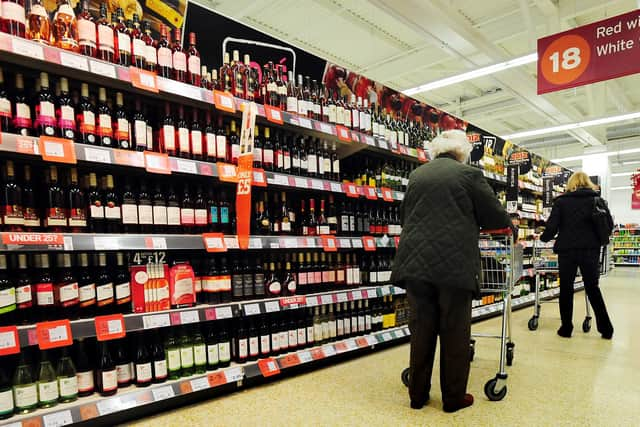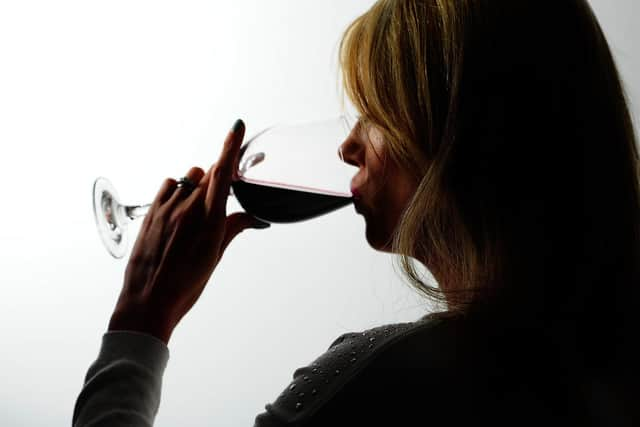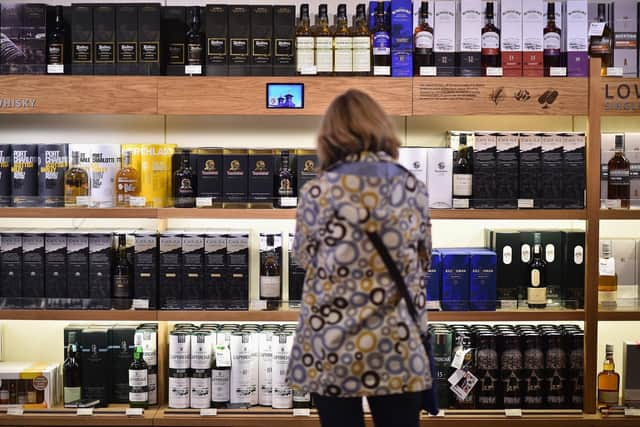Scotland alcohol deaths: Government could ban alcohol ads and raise minimum unit pricing rate to curb drink deaths
Doubts have been cast on the effectiveness of the Scottish Government's previous attempts to curb alcohol deaths, specifically the alcohol minimum unit pricing (MUP) policy, as a 14-year high was recorded.
The latest figures from the National Records of Scotland (NRS) show 1,276 people died from alcohol-specific causes, not including cancers caused by alcohol, last year. This is 31 more than in 2021, and the highest number since 2008.
Advertisement
Hide AdAdvertisement
Hide AdCampaigners responded by calling MUP base rate to be increased in response to the spiralling alcohol deaths, as a Scottish Government minister confirmed a controversial ban on alcohol marketing could still be in the works.


But the Scottish Conservatives claimed the rising number of deaths was evidence the MUP policy was “simply not working”, labelling the scheme as a “blunt instrument to tackle a complex problem”.
Male deaths continue to account for around two thirds of alcohol-specific deaths. However, female deaths last year increased by 31 to 440, with the number of alcohol-specific male deaths unchanged at 836.
Daniel Burns, head of vital events statistics at the NRS, said the number of deaths from alcohol-specific causes fell between 2006 and 2012, “but has risen since and is now about the same as 2010 levels”.
“In 2022, the average age at death for females from an alcohol-specific cause was 58.7 years and for males it was 60.0 years,” he said.


There are 4.3 times as many deaths from these causes in the most deprived communities as in the least deprived communities. This compares to a ratio of 1.8 times for all causes of death.
First Minister Humza Yousaf said in his first major speech in the role earlier this year that his Government would go “back to the drawing board” on proposals for a controversial advertising ban, which could have seen alcohol obscured in shops.
But responding to the latest figures, alcohol and drugs policy minister Elena Whitham said there were still 3,000 responses to the cancelled consultation to be analysed.
Advertisement
Hide AdAdvertisement
Hide AdShe said: “Whilst we are back to the drawing board, that doesn’t mean that it’s cancelled and it’s not going anywhere. It just means that we’re going to have a slightly different focus on it, but my focus on it is absolutely from a public health perspective.”


Ms Whitham defended her Government’s MUP policy, saying the drink deaths statistics would have been higher without the scheme.
“We know that the evaluation from Public Health Scotland (PHS) shows that there has been an estimated hundreds of people whose lives have been saved by minimum unit pricing,” she said. “Those are really positive measures, but I think if we didn’t have minimum unit pricing in place, I think that the deaths that we would be seeing today would have been higher.”
Her comments come with the Government coming under fire after reportedly altering a press release about the PHS report on its website to say the policy was “estimated to have saved lives” from the claim that “our world-leading policy is saving lives”.
In June, PHS released a meta analysis of more than 40 independent studies and concluded MUP was “effective”.
According to PHS, the meta-analysis shows MUP “has reduced deaths directly caused by alcohol consumption by an estimated 13.4 per cent and hospital admissions by 4.1 per cent, with the largest reductions seen in men and those living in the 40 per cent most deprived areas”.
The report’s authors say this equates to 150 fewer deaths and 400 fewer admissions in 2022/23, using England, which has not implemented a MUP policy, as a control.
Ms Whitham said both her and Mr Yousaf’s eyes were “firmly back on the ball” in the fight against addiction, echoing Nicola Sturgeon’s previous admission she had taken her “eye off the ball” with regards to Scotland’s drug death crisis.
Advertisement
Hide AdAdvertisement
Hide AdScottish Conservative shadow health secretary Dr Sandesh Gulhane described the figures are “utterly shocking”.
“Every one of these 1,276 deaths is a tragedy and has left families across Scotland grieving the loss of a loved one due to alcohol,” he said. “It is clear that the SNP wedding themselves to their flagship policy of minimum unit pricing is simply not working. It is increasingly proving to be a blunt instrument to tackle a complex problem.
“The SNP Government have even now had to embarrassingly amend a press release in which they were boasting about the apparent success of minimum unit pricing.
“Alcohol related-deaths are at their highest since 2008 on the SNP’s watch and are heading in the wrong direction year after year. Most shamefully for SNP ministers, it is people living in our most deprived communities who are suffering the most as a result of the SNP’s failure to get on top of this crisis.”
Meanwhile, Dr Alastair MacGilchrist, chair of the Scottish Health Action on Alcohol Problems (SHAAP), a partnership of the Medical Royal Colleges in Scotland and the Faculty of Public Health, said it was “vital” that MUP remained in place.
“Scotland is facing an ongoing crisis with alcohol which requires urgent attention,” he said. “We simply cannot continue to accept this level of avoidable alcohol harm as the Scottish reality.
“The Scottish Government must do more to ensure that this level of harm does not continue. It is essential that our Government addresses this public health emergency with the appropriate urgency and priority.
“It is vital that policies such as MUP remain in place to continue to reduce alcohol-related harms. The level at which MUP is set should be raised to at least 65p to maintain its benefit.
Advertisement
Hide AdAdvertisement
Hide Ad“Alongside this, the Scottish Government must address the wider availability and marketing of alcohol, in order to tackle the inescapable exposure to alcohol experienced by children and other vulnerable groups, such as people in recovery.”
Matt Lambert, chief executive of the Portman Group – a trade group consisting of UK-based alcohol companies, which describes itself as the “the UK alcohol marketing regulator and social responsibility body”, said: “Today’s figures showing a slight increase in alcohol-specific deaths are a reminder that every death is an absolute tragedy for the people concerned and their family and friends.
“Concerningly, this is the third yearly increase in a row, yet the latest data shows a significant slowing since the post-pandemic dramatic increase. We believe this reinforces the pressing need for targeting tailored medical and social support for those drinking at the heaviest and most harmful level as a key step to help reverse this worrying trend.”
Belinda Phipps, the chief executive at With You, a charity providing free, confidential support to people experiencing issues with drugs, alcohol or mental health, said Scotland needed to “better acknowledge the depth of this issue” to reverse the trend.
“While drug-related deaths in Scotland are finally starting to reduce, the number of deaths from conditions wholly caused by alcohol has grown every year since 2012,” she said. “I hope the Scottish Government will reflect on this and commit to approaching alcohol-related harms with the same urgency and determination as the National Drugs Mission.
“More than half of the people we support through our services across Scotland have come to us for help to reduce or stop their drinking. Often, they tell us that they feel like ‘frauds’ because they don’t consider their problems to be as serious as those of people using drugs.
“But, in 2022, 1,276 people died because of alcohol – and this ongoing increase is a pattern we have seen for more than ten years. As a nation, we need to better acknowledge the depth of this issue in order to change behaviours and save lives.”
Comments
Want to join the conversation? Please or to comment on this article.